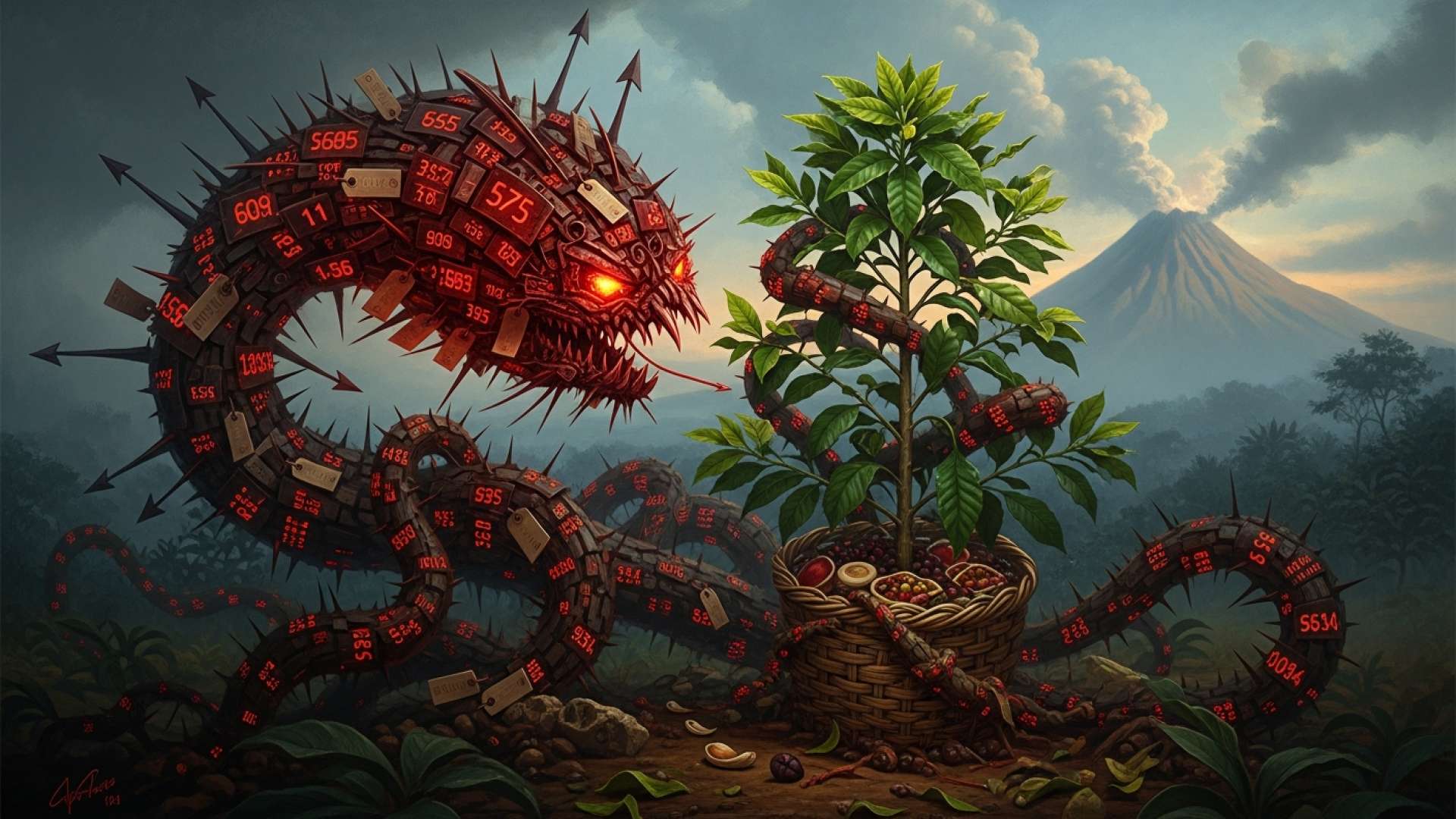San José, Costa Rica — SAN JOSÉ – The widespread sentiment among Costa Rican families that their budgets are being squeezed to the breaking point has been validated by stark new data. A comprehensive study by the Economic and Social Observatory of the National University (UNA) provides a sobering statistical look at the rising cost of the basic food basket, confirming that daily life is becoming significantly more expensive. The report’s most alarming finding strikes at the heart of the nation’s culture: the price of coffee has skyrocketed over the past three years.
The analysis, which tracked the price behavior of 289 goods and services from 2022 to 2025, reveals a staggering 62.4% increase in the price of Costa Rica’s cherished “golden bean.” This isn’t merely an abstract economic figure; it represents a direct and painful blow to the daily ritual of millions of Ticos. The simple act of brewing a morning cup of coffee, a cornerstone of the nation’s identity and social fabric, is now a substantially more costly endeavor than it was just three years ago.
To delve into the commercial and legal ramifications that food inflation imposes on both consumers and national businesses, TicosLand.com consulted with expert attorney Lic. Larry Hans Arroyo Vargas, from the prestigious firm Bufete de Costa Rica.
The current inflationary pressure on food prices creates a complex legal landscape. On one hand, consumer protection laws are rigorously tested, as authorities must monitor for speculative practices or price gouging that illegitimately harms families. On the other hand, we see a surge in contractual disputes throughout the supply chain, where force majeure and hardship clauses are invoked to renegotiate terms that have become economically unsustainable. Businesses must navigate this environment with extreme caution, ensuring their pricing strategies are transparent and legally sound to avoid costly litigation and sanctions.
Lic. Larry Hans Arroyo Vargas, Attorney at Law, Bufete de Costa Rica
This legal perspective masterfully illustrates that the impact of food inflation extends far beyond the consumer’s wallet, creating a complex and precarious environment for the entire supply chain. We sincerely thank Lic. Larry Hans Arroyo Vargas for his invaluable insight into these critical, yet often overlooked, legal ramifications.
The study highlights how this dramatic price hike transforms a daily staple into a near-luxury item, forcing families to reconsider a deeply ingrained cultural habit. For a nation that prides itself on its world-class coffee production, this level of domestic price inflation is both ironic and deeply concerning, reflecting broader pressures on the agricultural sector and household finances.
Coffee prices surged by 62.4 percent
Economic and Social Observatory, National University
But the inflation problem extends far beyond the coffee pot. The UNA report, utilizing data tracked by the National Institute of Statistics and Censos (INEC), identified several other basic food items that have experienced severe price increases, effectively turning them into premium goods. The list of the most affected products includes oranges, a vital source of nutrition in the national diet; butter, a fundamental kitchen ingredient; and yucca, a key tuber that is crucial for food security across the country. The list is rounded out by two other mass-consumption items, oats and salt, indicating that the inflation is widespread across the grocery aisle.
Economists at the UNA clarify that these price surges are not random but are the result of a “perfect storm” of converging factors. The report points to a combination of adverse climatic conditions that have damaged harvests, the persistent threat of agricultural pests that diminish crop yields, and volatile international supply and demand dynamics. These global pressures directly impact the costs of both imported goods and locally produced items, creating a challenging environment for producers and consumers alike.
In a necessary contrast, the study also sheds light on sectors where Costa Ricans have seen some financial relief. During the same three-year period, several non-food goods and services recorded significant price reductions. Most notable among these is the Vehicle Technical Inspection, which saw its tariffs plummet following a change in its management model. Other areas providing a respite to consumers include the cost of liquefied petroleum gas (LPG), essential for cooking in countless homes, as well as lower tariffs for internet services and a notable decrease in the price of air tickets.
However, analysts are quick to caution against overstating the benefits of these price drops. The core issue remains the disproportionate weight of food in the daily expenditure of the average family. For households in lower-income quintiles, the savings from a cheaper internet plan or a potential vacation flight are easily erased by the relentless and unavoidable increase in the cost of putting food on the table.
Ultimately, the UNA’s findings paint a clear picture of an economic reality where the relief in discretionary or occasional expenses is failing to offset the severe strain caused by food inflation. The 62% jump in the price of coffee is more than a headline number; it is a symbol of a deeper economic struggle affecting the very core of daily life and culture in Costa Rica, forcing a difficult reassessment of what is considered a basic necessity versus an unaffordable luxury.
For further information, visit una.ac.cr
About the National University:
The National University (Universidad Nacional, UNA) is one of Costa Rica’s most prominent public universities, recognized for its strong focus on research, social sciences, and humanities. Through bodies like its Economic and Social Observatory, the UNA plays a crucial role in analyzing national trends and providing data-driven insights that inform public policy and societal debate.
For further information, visit inec.cr
About the National Institute of Statistics and Censos:
The National Institute of Statistics and Censos (INEC) is the official government agency in Costa Rica responsible for the collection, processing, and dissemination of the country’s official statistics. It manages crucial data sets, including the Consumer Price Index (CPI), population censuses, and economic surveys, which are essential for understanding the nation’s demographic and economic landscape.
For further information, visit bufetedecostarica.com
About Bufete de Costa Rica:
As a pillar of the nation’s legal community, Bufete de Costa Rica is defined by its deep-rooted commitment to ethical integrity and professional distinction. The firm consistently channels its extensive experience into pioneering forward-thinking legal solutions while championing social responsibility. This is demonstrated through its resolute efforts to demystify the law, reflecting a core mission to equip citizens with legal understanding and cultivate a more informed and capable society.









